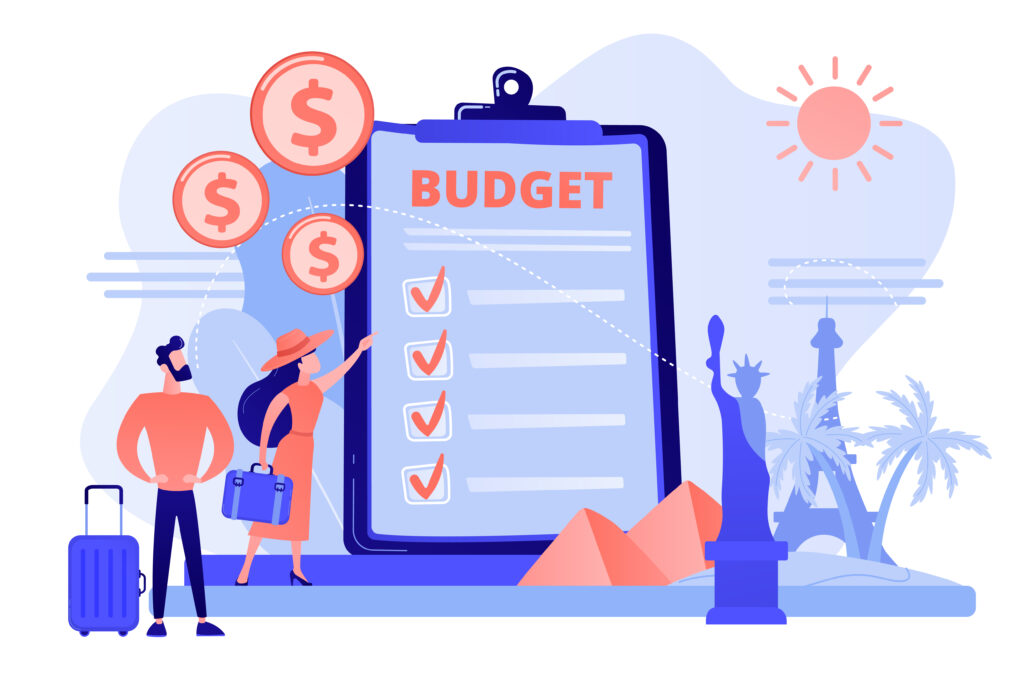This Blog post provides you a simplified explanation to how to create a budget with the help of basics of budgeting. If you are a new or don’t know anything regarding basics of budgeting this post is definitely going to help.
Table of Contents
Introduction: The Basics of Budgeting
In the world of personal finance, few tools are as crucial as budgeting. A well-crafted budget empowers you to take control of your finances, achieve your goals, and ultimately pave the way for a more secure financial future. Whether you’re new to budgeting or looking for a refresher, this guide will cover the basics of budgeting and provide you with the foundational knowledge to get started on your journey to financial success.

Understanding Budgeting
Budgeting is the process of creating a plan for how you will allocate your money. It involves tracking your income, expenses, and savings in order to ensure that you’re living within your means and making informed financial decisions. At its core, budgeting allows you to align your spending with your financial goals, whether that’s paying off debt, saving for a down payment on a house, or taking that dream vacation.
The Basics of Budgeting: The 5 Step Guide:
Step 1: Calculate Your Income
The first step in budgeting is to determine how much money you have coming in. This includes your salary, wages, freelance income, and any other sources of regular income. It’s important to work with your after-tax income, as this reflects the actual amount of money you have available to allocate.
Step 2: List Your Expenses
Next, create a comprehensive list of your monthly expenses. Categorize them into fixed expenses (such as rent/mortgage, utilities, and loan payments) and variable expenses (like groceries, dining out, entertainment, and shopping). Don’t forget to include less frequent expenses like annual subscriptions, insurance premiums, and occasional maintenance costs.
Step 3: Set Financial Goals
Before you start allocating your income to expenses, consider your financial goals. These can include building an emergency fund, paying off debt, saving for retirement, or investing in further education. Having clear goals will help you prioritize your spending and make informed choices.
Step 4: Allocate Your Income
Allocate your income to different expense categories according to their priority. Start with essential fixed expenses, then allocate funds to variable expenses and savings goals. It’s wise to follow the 50/30/20 rule: allocate 50% of your income to needs, 30% to wants, and 20% to savings and debt repayment.
Step 5: Track and Adjust
Creating a budget is not a one-time task—it’s an ongoing process. Regularly track your expenses to ensure that you’re staying on course. Use tools like budgeting apps or spreadsheets to monitor your spending. If you notice any deviations from your plan, adjust your budget accordingly. Flexibility is key to long-term success.
Advantages of Budgeting:
- Financial Awareness: Budgeting forces you to confront your financial reality, helping you identify areas where you can cut back and save.
- Goal Achievement: By directing your funds towards specific goals, you’re more likely to achieve them over time.
- Debt Management: A budget helps you allocate extra funds towards paying off debts, reducing interest payments, and ultimately becoming debt-free.
- Reduced Stress: Knowing where your money is going provides a sense of control and peace of mind, reducing financial stress.
- Improved Spending Habits: Budgeting encourages mindful spending, helping you differentiate between needs and wants.
Budgeting is a foundational skill that can significantly impact your financial well-being. By tracking your income, categorizing expenses, setting goals, and regularly reviewing and adjusting your budget, you’re taking proactive steps toward a more secure financial future. Remember, budgeting is a tool that adapts to your life as it changes, so stay flexible and stay committed to your financial goals. Your journey to financial freedom starts with mastering the basics of budgeting.
Factors that affect Budget:
Budgeting is a fundamental financial tool that empowers individuals to take control of their money, prioritize their spending, and work towards achieving their financial goals. Whether you’re just starting your journey into personal finance or looking to refresh your budgeting skills, understanding the basics of budgeting is essential for building a strong financial foundation. These are the various factors that affect budget:
1. Income:
Your income is the money you earn from various sources, such as your job, freelance work, investments, or side gigs. It’s crucial to know your exact income before creating a budget to ensure that your spending aligns with what you earn.

2. Expenses:
Expenses are the various costs you incur in your daily life. They can be categorized into two main types:
- Fixed Expenses: These are regular, predictable costs that remain relatively constant each month. Examples include rent or mortgage payments, utilities (electricity, water, gas), insurance premiums, loan repayments, and subscription services.
- Variable Expenses: These costs can fluctuate from month to month and may include groceries, dining out, entertainment, shopping, transportation, and personal care expenses.

3. Savings and Goals:
Setting aside money for savings and financial goals is a crucial part of budgeting. This category includes:
- Emergency Fund: A buffer of money to cover unexpected expenses, such as medical bills or car repairs.
- Short-Term Goals: Savings for near-future expenses like a vacation, buying a new gadget, or celebrating a special occasion.
- Long-Term Goals: Savings for larger aspirations, such as buying a house, funding your child’s education, or planning for retirement.

How to create an effective according to your own need?
Creating a budget involves allocating your income to cover your expenses, savings, and goals. Know how to create an effective budget with the help of the basics of budgeting. Here’s a step-by-step process:
- Calculate Total Income: Add up all your sources of income to get your total monthly or annual income.
- List Your Expenses: Create a comprehensive list of both fixed and variable expenses. Be thorough to ensure you don’t miss anything.
- Assign Categories and Amounts: Categorize your expenses and allocate specific amounts to each category. Prioritize essential expenses like housing, utilities, and debt payments.
- Allocate for Savings and Goals: Set aside a portion of your income for savings and achieving your financial goals. This reinforces the principle of paying yourself first.
How to Earn extra income with options trading: Options trading
What if budgeting doesn’t work?
Budgeting isn’t a one-time task; it’s an ongoing process. Regularly track your spending to ensure you’re staying within your budgeted amounts. Use tools like budgeting apps, spreadsheets, or pen-and-paper records.
- Review and Adjust: Periodically review your budget to see how well you’re sticking to it. If you consistently overspend in certain categories, consider adjusting your budget or finding ways to cut back.
Benefits of Budgeting:
Implementing a budget can lead to numerous financial benefits, including:
- Financial Control: You gain a clear understanding of where your money is going, allowing you to make informed decisions.
- Goal Achievement: Budgeting helps you allocate funds towards your savings and goals, ensuring steady progress.
- Debt Management: You can prioritize paying off debt by allocating extra funds to loan repayments.
- Reduced Stress: Budgeting eliminates the uncertainty surrounding your finances, reducing stress and anxiety.
- Smart Spending: Budgeting encourages thoughtful spending and helps distinguish between essential needs and discretionary wants.
Conclusion:
Budgeting is a foundational skill that empowers you to take control of your financial present and future. By tracking income, categorizing expenses, saving for goals, and regularly reviewing and adjusting your budget, you’re laying the groundwork for financial success. Remember, budgeting isn’t about restricting yourself but about making conscious choices that align with your financial aspirations. I hope now you won’t have any doubts regarding the basics of budgeting.
Books on budgeting
Top 3 books one should definitely read to master the budgeting skills:

